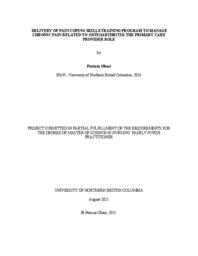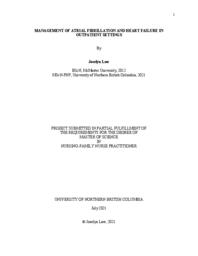Dewell, Sarah
Person Preferred Name
Sarah Dewell
Related Works
Content type
Digital Document
Origin Information
Content type
Digital Document
Description / Synopsis
Osteoarthritis (OA) is the primary form of arthritis that affects a large portion of the Canadian population. With expected increases in OA prevalence over time, the magnitude of outcomes related to inadequate pain control will place further burdens on society and healthcare resources. Pain Coping Skills Training (PCST) is an intervention protocol derived from cognitive behavioural therapy and has traditionally been delivered by clinical psychologists to manage chronic pain related to OA. However, few providers in the primary care setting are trained in PCST. The lack of trained primary care providers creates a barrier to patient access in the community setting, which should be addressed. An integrative literature review has been conducted to identify if primary care providers, who work in primary care settings, can deliver PCST interventions to decrease pain interference and improve quality of life outcomes in adult patients diagnosed with OA. The results are discussed within the context of Canada's primary care practice. Eleven articles were reviewed using Whittemore and Knafl’s approach to the integrative literature review. The results suggest that PCST interventions are both practical and possible among providers that do not possess a background in mental health specialization. Thus, primary care providers are encouraged to obtain educational competency to deliver this effective therapy to manage the adverse psychological effects on chronic pain related to OA. This way, providers can offer a biopsychosocial approach in managing OA while also playing an essential role in improving access to PCST interventions in the primary care setting. Recommendations for facilitating the uptake of PCST interventions are discussed, and specific strategies for its use in primary care are presented.
Origin Information
Content type
Digital Document
Description / Synopsis
Atrial fibrillation (AF) and heart failure (HF) have a highly interconnected relationship with similar risk factors and shared pathophysiology. They often occur together and are associated with increased morbidity and mortality. Unfortunately, the presence of one condition has implications for the treatment of the other. Guidelines exist for each disease, however, do not provide clarity when treating the conditions together. Due to the complex nature of the combined diseases, management requires a systematic and collaborative approach in primary care settings. The integrative review seeks to explore the following question, “How can the nurse practitioner (NP) best manage HF patients with AF in outpatient settings to help reduce the burden on the healthcare system?” A comprehensive search of the literature was undertaken and 20 articles were selected based on the inclusion criteria. The review findings provide insight into the diverse treatment options available to persons living with concomitant AF and HF. From the literature, catheter ablation, an invasive and specialized procedure, emerged as a superior treatment strategy for patients with combined AF and HF, particularly when compared the pharmacotherapy of rate and/or rhythm control. The management of AF in the setting of HF requires a collaborative approach between primary care providers (PCP) as well as specialists that are able to help manage the population of interest, such as cardiologist and electrophysiologists. Recommendations for practice, education, research, and policy have been made to support the role of PCPs, including NPs, in the management of AF in the HF population.
Origin Information



